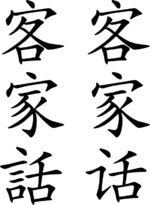Hakka language
| Hakka | |
|---|---|
| 客家語/客家语/客家話/客家话 | |
 Hak-kâ-fa/Hak-kâ-va (Hakka/Kejia) written in Chinese characters | |
| Native to | China, Thailand, Malaysia, Taiwan, Hong Kong, Japan (due to presence of Taiwanese community in Tokyo-Yokohama Metropolitan Area), Singapore, Indonesia, Mauritius, Suriname, South Africa, India, Vietnam and other countries where Hakka Chinese-speaking migrants have settled. |
| Region | in China: Eastern Guangdong province; adjoining regions of Fujian and Jiangxi provinces |
| Ethnicity | Hakka people (Han Chinese) |
Native speakers | 30 million (2007)[1] |
| hanzi, romanization[2] | |
| Official status | |
Official language in | none (legislative bills have been proposed for it to be one of the "national languages" in the Republic of China) |
Recognised minority language in | one of the statutory languages for public transport announcements in the ROC;[3] government sponsors Hakka-language television station to preserve language |
| Language codes | |
| ISO 639-3 | hak |
| Glottolog | hakk1236 |
 | |
| Hakka | |||||||||||||||||||||||||
| Traditional Chinese | 客家話 | ||||||||||||||||||||||||
|---|---|---|---|---|---|---|---|---|---|---|---|---|---|---|---|---|---|---|---|---|---|---|---|---|---|
| Simplified Chinese | 客家话 | ||||||||||||||||||||||||
| |||||||||||||||||||||||||
Hakka is a dialect of the Chinese language spoken mainly in southern China by the Hakka people and their descendants now living in East and Southeast Asia and countries around the world.
References[change | change source]
- ↑ Mikael Parkvall, "Världens 100 största språk 2007" (The World's 100 Largest Languages in 2007), in Nationalencyklopedin
- ↑ Hakka was written in Chinese characters by missionaries around the turn of the 20th century.[1] Archived 2004-08-22 at the Wayback Machine
- ↑ http://zh.wikisource.org/wiki/%E5%A4%A7%E7%9C%BE%E9%81%8B%E8%BC%B8%E5%B7%A5%E5%85%B7%E6%92%AD%E9%9F%B3%E8%AA%9E%E8%A8%80%E5%B9%B3%E7%AD%89%E4%BF%9D%E9%9A%9C%E6%B3%95
Further reading[change | change source]
Hakka Chinese edition of Wikipedia, the free encyclopedia
- The Hakka Dialect. A Linguistic Study of its Phonology, Syntax and Lexicon, by Mantaro J. Hashimoto. (Cambridge University Press, 1973).
